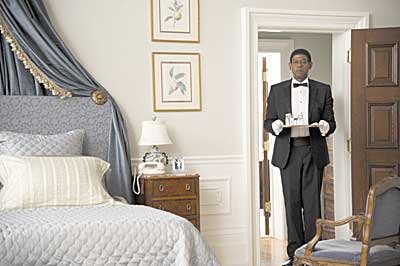If gay filmmaker and native Philadelphian Lee Daniels’ name wasn’t on “Lee Daniels’ The Butler,” opening today at area theaters, fans of his films — “Shadowboxer,” “Precious” and “The Paperboy” among them — would be surprised at the nuance and subtlety he employs to tell the story of Cecil Gaines (Forest Whitaker), the White House butler of the title.
This epic drama, based on actual events, traces civil-rights issues in America at both the macro and micro levels. It is an absorbing story, told extremely well. Daniels coaxes strong performances from his entire cast just as Cecil assuredly serves seven presidents. And he shrewdly uses archival film clips to show important historical moments while indicating the passage of time.
The elderly Cecil tells the narrative of his life in a poignant, reflective voice-over. After a traumatic childhood incident in the cotton fields, Cecil is taught how to serve in a house. His skills — knowing and anticipating what folks need — help him get a job at a Washington, D.C., hotel, and he is soon invited to serve in the White House. His interview is one of the film’s best scenes, as it illustrates that Cecil knows how to act in a critical situation.
But “Lee Daniels’ The Butler” also reveals how Cecil is taught to show both a public and a private face. At work, he hides his true feelings, showing respect to an untamed Richard Nixon (John Cusack) or an indisposed Lyndon Johnson (Liev Schreiber). At home, with his wife Gloria (Oprah Winfrey), he lets his guard down, but not entirely. Proud that he can support his family with his job, Cecil also silently acknowledges that he cannot always attend to them.
Whitaker is quite emotive, particularly when he says nothing. On a drive home from a day of work, Cecil’s expression is weary. He is suitably tired, and understands he is expected to return and serve again the next day.
His story is contrasted with that of his elder son Louis (David Oyelowo), who is politically active where his father is passive. Louis stages sit-ins in “whites-only” sections in a Woolworth Diner, joins the Freedom Riders and eventually the Black Panthers. He gets arrested frequently, while his father works in the rarified White House. Louis’ story forms the emotional heart of the film. It is Cecil’s son’s efforts that place the civil-rights issues in bold relief and attract the president’s attention in each era. Whereas Cecil is told to “hear nothing, see nothing and only serve,” Louis is out protesting and fomenting change.
This father-son story provides the film with most of its dramatic conflicts. Cecil is troubled by Louis’ behavior, and the two men do not speak for long periods. “Lee Daniels’ The Butler” hinges on this strife, which has the father as a dignified servant who seeks equality in the workplace while the son is out on the streets, generating attention and interacting with notable activists and leaders. A dinner-table scene in which Cecil kicks his son out of the house over this divide is especially powerful.
Daniels’ restraint helps to make his film so gripping. The filmmaker avoids showy moments, with important scenes ranging from the assassination of Martin Luther King Jr. and John F. Kennedy to the death of members of Cecil’s family and friends happening off screen. The drama here is emotional, and Daniels never overemphasizes it. This is most notable in a key scene, set in the 1980s, in which Cecil gets to be served, rather than to serve. Cecil’s response following that particular dinner is telling, as it prompts a change of heart and mind about his life and work and family. This is what makes “Lee Daniels’ The Butler” so moving: The personal becomes political.
If the film is anchored by Whitaker’s remarkable performance, he is ably supported by Winfrey. She makes Gloria a sympathetic character, a woman who is tough and loving, but also troubled at times. Oyelowo is excellent as Louis, and Cuba Gooding Jr. is amusing as Cecil’s foul-mouth and foul-minded fellow butler, Carter. In smaller roles, Clarence Williams III and Terrence Howard have memorable turns as Cecil’s mentor and Gloria’s neighbor, respectively.
“Lee Daniels’ The Butler” culminates with the election of Barack Obama, which leads to an appropriate and highly satisfying ending for Cecil’s story. It is a journey through American history that deserves to be seen. Daniels and his cast and crew deserve applause for bringing it so vividly to life.

